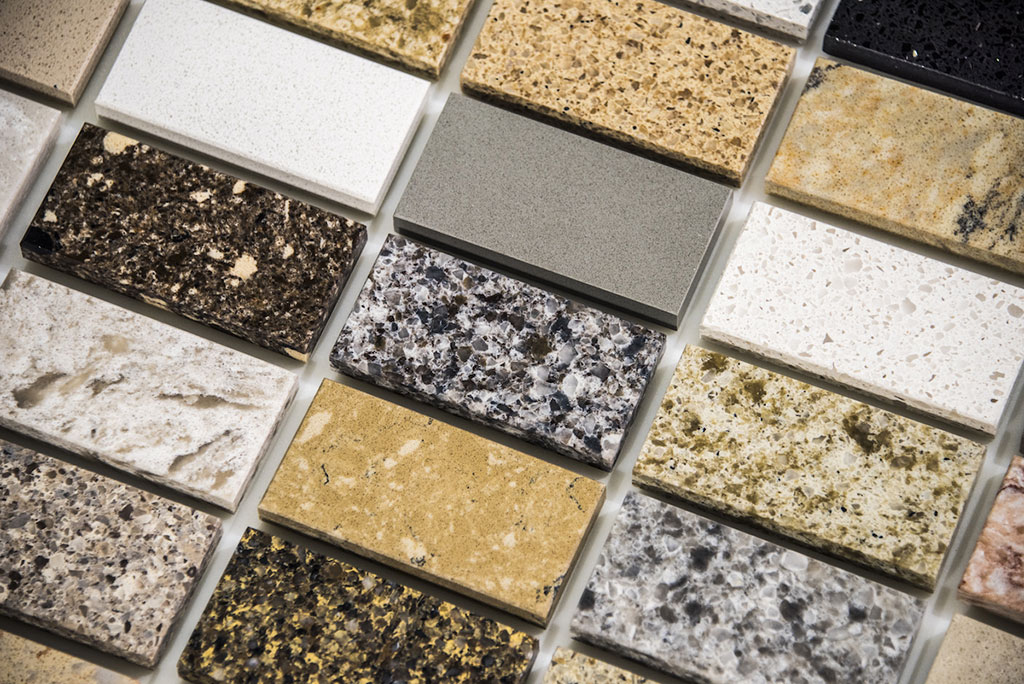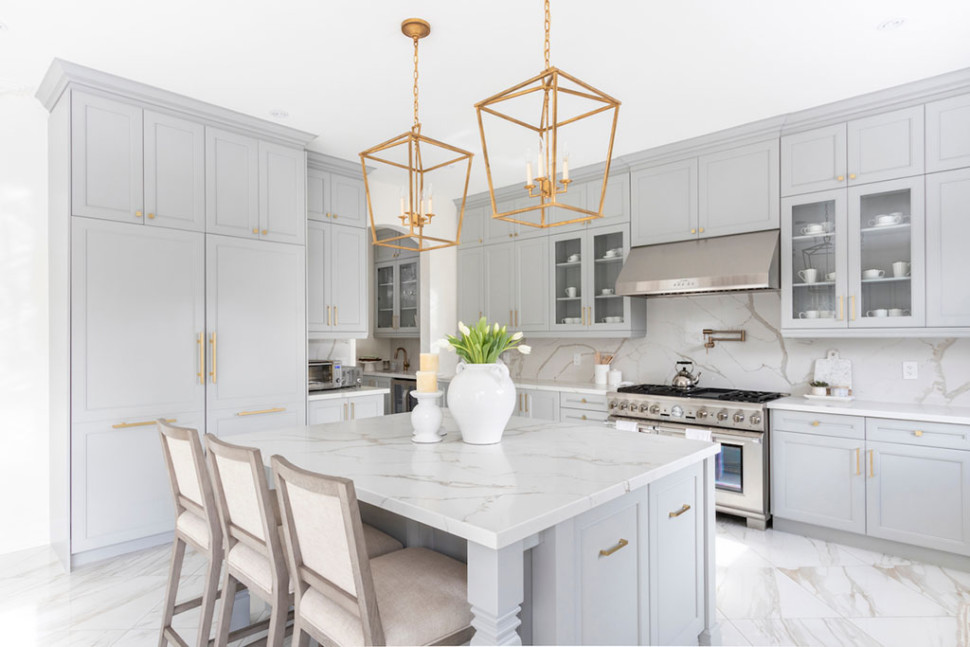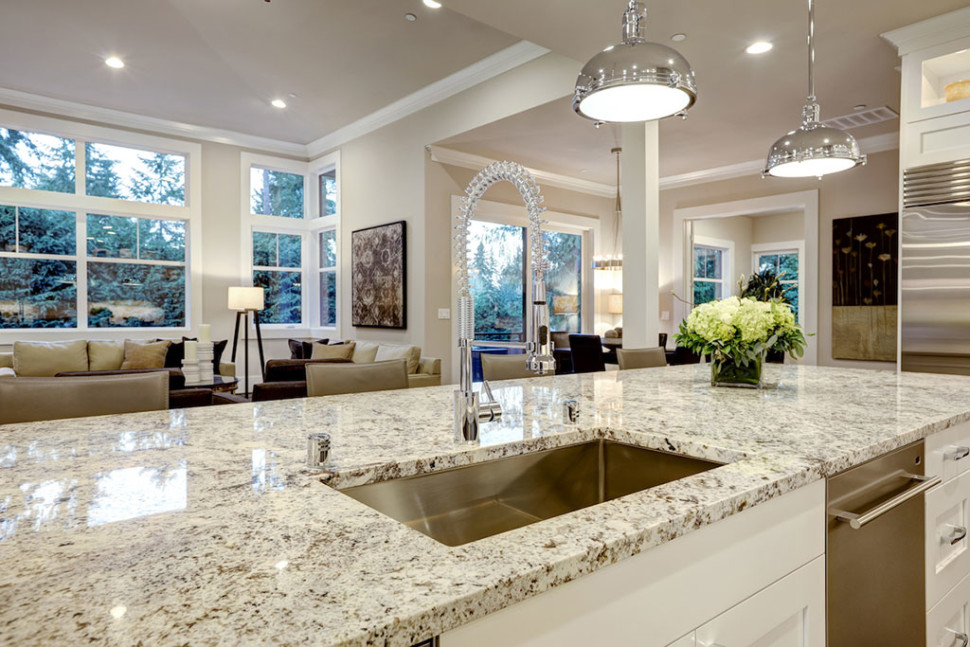Comparing Quartz vs. Granite Countertops

Quartz vs. Granite Countertops: Which is Better?
Quartz and granite are both fantastic countertop materials, but they’re quite different. Do you know which option is best for you? We’ll compare quartz vs. granite countertops so you can decide the ideal choice for your home.
Comparing Quartz vs. Granite Countertops
Evaluate the pros and cons of quartz countertops before making this crucial decision for your home update.
Benefits of Quartz Countertops
Quartz is not an entirely natural material. It consists of about 95% ground natural stone and about 5% polymer resins. For this reason, quartz is considered an engineered stone.
Quartz’s unique properties give it some unique advantages as a countertop material, including:
- Style — When it comes to colors and patterns, the options are nearly endless.
- Design Variation — Design options range from simple to complex imitations of marble and granite.
- Low Maintenance — The surface is non-porous and doesn’t require heavy cleaning or maintenance.
- Durable — Quartz countertops are highly durable. They can last a lifetime with little to no scratches or chips.
- High ROI — The popularity of quartz has increased in recent years, so their highly valued when selling your home.
- Warranty — Because of their high durability, quartz counters usually have a lifetime warranty.
- Stain Resistant — Since quartz countertops are non-porous, they’re stain-resistant.

Problems with Quartz Countertops
However, just like any other countertop material, quartz does come with its disadvantages. It’s important to understand how much they’ll affect you and your home before purchasing.
- Price — Quartz is one of the most expensive countertop materials on the market.
- Susceptible to Heat — The resin that holds quartz particles together isn’t heat resistant. If you expose a quartz countertop to heat, it may overheat, resulting in a “halo effect” on the countertop.
- Manufactured — Many of the materials in quartz are naturally occurring, but overall it’s a manufactured option.
- Professional Installation Required — DIY installation isn’t recommended, so you’ll have to pay a professional to do the job.
- Not Great for Outdoors — When quartz is installed outdoors and exposed to direct sunlight, the UV rays from the sun will cause discoloration of the counters. Therefore quartz can’t be used for any outdoor kitchens or entertaining spaces.
Benefits of Granite Countertops
Granite has been a sought-after countertop material for years. Here are some of the main reasons why.
- Natural — Granite is a natural stone with none of the synthetic polymer resins or additives found in other counters.
- Unique — Since it isn’t manufactured, every piece of granite is unique, and you’ll never find two counters that look the same!
- Heat Resistant — Granite is more heat resistant and durable than quartz or marble.
- Stain Resistant — When granite is sealed correctly, it’s practically stain-resistant.
- Easy to Clean — Granite is low-maintenance and doesn’t require a lot of upkeep. Harsh chemicals can even be used on it to disinfect the area.
- Budget Friendly — The price of granite can range from high to low, so finding an option within your budget is viable.

Problems with Granite Countertops
Of course, no countertop material is perfect. There are some common grips against granite countertops as well. Here are the main ones to be aware of.
- Multi-Colored Options Only — Because of the natural grains and veining, you can’t get a completely solid color of granite.
- Outdated Styles — Some homeowners find the shades and colors of granite to be outdated.
- Business — Granite patterns can also look busy, which isn’t ideal for homeowners who want a more modern or clean aesthetic.
- Noticeable Seams — If your counters are shaped like an “L” or “U,” the slabs will need to be cut and joined together, and the seams will show.
- Requires Sealant — Granite is naturally porous, so you’ll need to ensure it’s professionally sealed.
- Not Crack-Proof — The edges are prone to cracking.
- Temperature — Granite can be quite cold to the touch, which can turn some owners off, especially when they put their hot coffee on the counter and it cools down quickly.
- Difficult Removal — Granite is difficult to uninstall without damaging the cabinets underneath.
Invest in High-Quality Countertops From Elevations Design Studio by Zeeland Standard
Whether you want quartz or granite kitchen countertops, we have them both at Elevations Design Studio by Zeeland Standard! With a variety of materials, styles, colors, and brands, you’re sure to find the perfect one for your new space. And if you need help deciding, our kitchen experts are always happy to help.
From stunning waterfall edges, to dramatic patterns, to minimalist black and whites, we have many options to fit your home’s aesthetic. Contact our team for more information.
